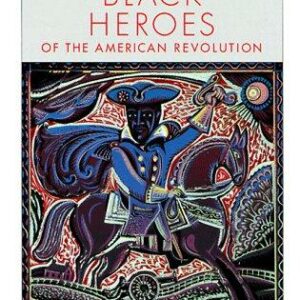Description
In The Story of Oklahoma, Deputy U.S. Marshal Bass Reeves appears as the “most feared U.S. marshal in the Indian country.” That Reeves was also an African American who had spent his early life enslaved in Arkansas and Texas made his accomplishments all the more remarkable. Black Gun, Silver Star sifts through fact and legend to discover the truth about one of the most outstanding peace officers in late nineteenth-century America—and perhaps the greatest lawman of the Wild West era.
Bucking the odds (“I’m sorry, we didn’t keep Black people’s history,” a clerk at one of Oklahoma’s local historical societies answered one query), Art T. Burton traces Reeves from his days of slavery to his Civil War soldiering to his career as a deputy U.S. marshal out of Fort Smith, Arkansas, when he worked under “Hanging Judge” Isaac C. Parker. Fluent in Creek and other regional Native languages, physically powerful, skilled with firearms, and a master of disguise, Reeves was exceptionally adept at apprehending fugitives and outlaws and his exploits were legendary in Oklahoma and Arkansas.
In this new edition Burton traces Reeves’s presence in the national media of his day as well as his growing modern presence in popular media such as television, movies, comics, and video games. In this new edition of the biography of Bass Reeves, who was formerly enslaved and then served as a peace officer in and around late nineteenth-century Indian Territory, Art Burton traces Reeves’s presence in contemporary national media and in popular modern media. Art T. Burton is a retired professor of history at South Suburban College in South Holland, Illinois. He is the author of Black, Buckskin, and Blue: African American Scouts and Soldiers on the Western Frontier and Black, Red, and Deadly: Black and Indian Gunfighters of the Indian Territory, 1870–1907.
List of Illustrations
Foreword
Acknowledgments
Introduction: Uncovering the History of Black Deputy U.S. Marshals
1. The Lone Ranger and Other Stories
2. Arkansas Son
3. Van Buren and Fort Smith
4. On the Trail
5. “No Sunday West of St. Louis, No God West of Fort Smith”
6. Gunman’s Territory
7. Hell on the Border
8. Trial of the Century
9. Back on the Trail
10. TheWinds of Change
11. Land of the Six-Shooter
12. Paris, Texas
13. Northern District, Indian Territory
14. Muskogee Marshal
15. A New Century
16. Devotion to Duty
17. The Invincible Marshal
18. A Lawman to the End
Epilogue
Appendix
Notes
Bibliography
Index
"As Burton traces Reeves' exploits through oral accounts, records of court proceedings and scraps of correspondence, his fascination with the subject helps to maintain a vigorous pace and ultimately makes Black Gun, Silver Star an eye-opening study of justice and race in the Old West."—Nick Smith, The Post and Courier (Charleston, SC)
"Art Burton has resurrected a heroic Black U. S. Deputy Marshal that thieves and outlaws in the Indian Territory could not kill but was practically eliminated by scholars of frontier history."—Bruce T. Fisher, curator of African American History, Oklahoma Historical Society
“Art Burton’s extensive research for Black Gun, Silver Star fleshes out the fascinating life story and exploits of a former slave who became one of the most famous lawmen in the Indian Territory days of ‘Hanging Judge’ Isaac Parker.”—William Black, Superintendent Fort Smith National Historic Site
“This is a book that should become mandatory reading for any student of American Frontier history.
Black Gun, Silver Star not only answers questions about Bass Reeves, the man, but it also provides insight into the incredible courage and extraordinary skill required in nineteenth-century law enforcement. Those with a passion for history, particularly of the nineteenth century, will find this biography of Reeves to be an essential book for their library.”—Angela Y. Walton-Raji, author of
Black Indian Genealogy Research “Burton is a generous author who shares his thinking and analysis with the reader, and explains his personal fascination with the story of Bass Reeves. The result is a highly readable book with a tone that will appeal to several audiences.”—Barbara C. Behan,
Journal of African American History "In the long, sanguinary history of the battle to bring law and order to the violent American West there was no greater or more important figure than this former slave who spent his life enforcing the law in what was the most lawless section of the country. Because Reeves was Black, his remarkable career for the most part was overlooked by the contemporary press, making it difficult now to reconstruct his history, but author Art Burton has admirably tackled the task and told a story, long overdue."—Robert K. DeArment, author of
Bravo of the Brazos: John Larn of Fort Griffin, Texas “[This] biography is more statement of fact than tribute to Reeves and no punches are pulled. Bass had an exceptionally long tenure as a Deputy U. S. Marshal and made a few mistakes along the way. These are covered. But, so too, are the remarkable feats he accomplished. . . . No critic, then or now has been able to show that Bass did not do good and bring law and order to the frontier. Art’s rendering takes on all comers and their questions. The book is a heck of a good read and not the least bit painful.”—Mike Tower,
Oklahombres.org “Aside from a few fluff films (like Mel Brooks’s Blazing Saddles) and a smattering of lesser-known scholarship, the African-American presence in Wild West history has been severely underrepresented. . . . Against this backdrop rises Burton’s painstaking account of U.S. Deputy Marshal Bass Reeves. . . . Rigorous and impartial, Burton is less concerned with entertainment than faithful research—no small task given the Old West’s diverse and troubled racial climate, in which Black accomplishment often went overlooked. But dedicated readers will become acquainted with a brave, resourceful lawman and the patchwork of homesteaders, murderers, horse thieves and bootleggers he governed.” —Publishers Weekly.
“[Burton’s] years of research resulted in a remarkable story of an Old West giant, one who arguably was the best in his business.”—
True West “The book is a good addition to the history of law enforcement in the Twin Territories. Students of this area will certainly want to add the book to their library.”—Western Outlaw-Lawman History Association Journal










